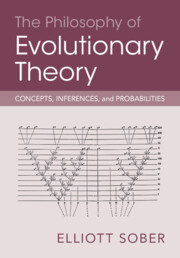‘Philosophy of biology has grown into a respectable and autonomous discipline, but also become increasingly specialized and fragmented. Elliott Sober's book is poised to rekindle meta-scientific exploration into the epistemological and ontological dimensions of evolutionary biology, and demonstrates to both philosophers and biologists that evolutionary biology remains a fertile ground teeming with captivating conceptual issues.'
Jun Otsuka - Kyoto University
‘Elliott Sober has provided an excellent, lucid tour through all the important concepts and advances in evolutionary theorising from Darwin to the present. His expositions and arguments draw on a wealth of philosophical and biological material, including many of his own original contributions to the field. Philosophers and biologists will find much to ponder, as will non-specialists with an interest in evolutionary theory.'
R. Paul Thompson - University of Toronto
‘The Philosophy of Evolutionary Theory succeeds in providing readers with a solid foundation in many of the significant topics in evolutionary biology. Like all of Sober’s books, the writing style is clear and succinct. Each chapter aims to summarize one major evolutionary concept and provides insight into debates in the field, along with several suggestions for further study. At first glance, the somewhat modest length of the book would seem to indicate a cursory overview of these complex ideas (e.g., units of selection, fitness, adaptationism, etc.). However, this is a testament to Sober’s ability to explain intricate concepts concisely. Each chapter is a fantastic introduction to these fundamental evolutionary topics and will provide a reader with a sophisticated understanding of often misunderstood ideas. I highly recommend this book to advanced undergraduates, graduate students, and professionals.’
Stephen Smith - University of Michigan
‘This excellent book should appeal to scholars from many different disciplines. … Highly recommended.’
J. S. Schwartz
Source: CHOICE
‘The Philosophy of Evolutionary Theory ties evolutionary theory to philosophical matters such as causation, levels of organization, reductionism, essentialism, and interpretations of probability. … The Philosophy of Evolutionary Theory can thus provide working scientists-in particular, Evolution readers who may be theoreticians, experimentalists, or field biologists-with tools for self-reflection and critical thinking about their scientific work. This can help inspire the growth of scientific theory, or the expansion and critique of both experimental design and statistical analysis. It can also just be great fun to think about the foundations of your favorite field of scientific inquiry.’
Source: Evolution



